Trayvon Martin
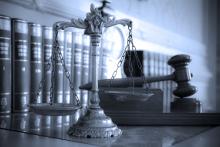
Oddly, I wasn't there the night George Zimmerman shot Trayvon Martin. I wasn't in the jury box either. Some commentators, like Ezra Klein and Ta-Nahesi Coates, are saying the not guilty verdict was appropriate according to Florida's "stand your ground" law. (Note that they are not saying that the Florida law is appropriate; Klein uses the word outrageous).
If this verdict was appropriate, though, what about verdicts in cases that were similar except for the color of the defendant? What happened to the "stand your ground" law when the jury reached its verdict against Marissa Alexander — an African American woman from Jacksonville, Fla.?
And anyway, why should fear of attack justify shooting to kill? It didn't in the case of John White — an African American man from Long Island, N.Y. — who shot a (white) teenager in 2006 (accidentally, he says, when the boy was trying to grab his gun).
John White, it appears, had good reason to fear the boys who showed up on his doorstep that night. That's probably why the governor commuted his sentence after he had served five months. And White no doubt should have served some time, according to New York law — his gun was unregistered, and if he hadn't been holding it when he went to the door, a scuffle probably wouldn't have escalated into manslaughter.
But, some say, the only thing that stops a bad guy with a gun is a good guy with a gun. Is this true?
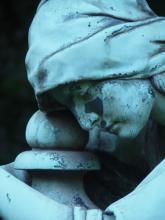
Carolyn Winfrey Gillette, a pastor who is a foster mother to a four year-old African American boy, wrote this hymn after George Zimmerman was found not guilty for his shooting of Trayvon Martin. She had read Jim Wallis’ “Lament from a White Father” and heard the Rev. Otis Moss of Chicago's Trinity United Church of Christ interviewed for the NPR report, “For The Boys Who See Themselves In Trayvon Martin.”
We Pray for Youth We Dearly Love
O WALY WALY LM (“Though I May Speak”)
Solo (optional young voice):
“If I should die before I wake,
I pray thee, Lord, my soul to take....
And if I die on violent streets,
I pray thee, Lord, my soul to keep."
(Continued at the jump)
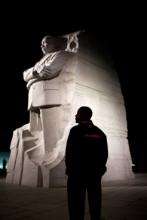
I first learned about President Obama’s comments about racism and the Trayvon Martin case last week when a Facebook friend posted a link with this comment:
“Full text of the American President’s divisive and racist remarks today. He moves smoothly into his new role as race-baiter in chief.”
My friend’s anger was matched by many others from PowerLine to Breitbart. But what I read seems to me as controversial as tomorrow’s sunrise and incendiary as wet newspaper.
Let me try an analogy.
Imagine that Joe Lieberman had been elected our first Jewish president. And that in a moment of crisis, he felt compelled to explain that some reaction to even the hint of anti-Semitism is partly explained by the Jewish cultural memory of the Holocaust. And he included personal anecdotes about growing up Jewish in America.
Would he be accused of being divisive and guilty of whatever the Jewish equivalent of “race-baiting” might be?
Sen. John McCain is requesting review of the recently publicized “stand your ground” law in the state of Arizona. Following an outpouring amount of controversy over the acquittal of George Zimmerman in the Trayvon Martin case, McCain is requesting action from Arizona state officials by asking them to reconsider the rules and regulations of the law. The Huffington Post reports:
Sen. John McCain (R-Ariz.) said on Sunday that while he does not question the decision of the jury in the Trayvon Martin case, he does think all states, including his own, should review their "stand your ground" laws.
Read more here.

This morning I began preparing for a trip to Canada. I pulled out my grey North Park University hoodie to pack for the colder nights. Last year, a few days after the shooting of Trayvon Martin, North Park sponsored a justice conference. I wore that hoodie during my talk.
In retrospect, it feels like an empty gesture — an attempt to empathize with an experience that I, as a Korean-American, could never fully understand. In light of the Zimmerman verdict, I’ve been stunned into silence. I’m reeling from a deep disappointment in the American justice system and maybe even more distraught by the response of many in the white evangelical community that wants to argue the minutia of the law rather than trying to understand our brothers and sisters who are expressing a deep sense of lament.
The tragedy of Trayvon Martin requires an ongoing lament, which may be why it has been so difficult for evangelicals to engage on this issue.
President Obama addressed the nation today regarding the George Zimmerman trial, giving his thoughts on the nation's response to the verdict and the state of racism in our society.
Folks understand the challenges that exist for African-American boys, but they get frustrated, I think, if they feel that there’s no context for it or — and that context is being denied. And — and that all contributes, I think, to a sense that if a white male teen was involved in the same kind of scenario, that, from top to bottom, both the outcome and the aftermath might have been different.
You can read the full transcript of his speech here.
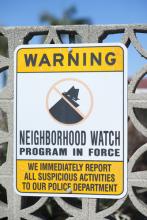
Florida’s “stand your ground” law — a source of collective ire at present — is an iteration of the Good Samaritan Laws that exist in this country: laws that offer protection from lawsuits for those who help or protect their neighbors. If you dig a hole to save a child’s life, that child’s family can’t sue you for damage to their lawn. Sounds like a good thing, right? Sounds like the spirit of these laws comes directly from the Bible.
Neighborhood Watch programs are born from the same spirit: they empower those who want to protect their neighbor with the authority to do so. George Zimmerman was allowed to have a gun so that he could be a Good Samaritan.
The problem with Neighborhood Watch programs and stand your ground laws is that, in their rush to be the Samaritan in the story, they never ask the question the lawyer asks in Luke 10: “Who is my neighbor?”
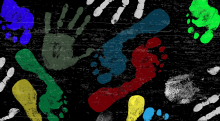
What better way to honor Nelson Mandela on his 95th birthday today than to reflect on his concept of Ubuntu? Ubuntu, a word from the Bantu languages of southern Africa — roughly translated “I am because we are” — sums up Mandela’s approach to leadership, incorporating a generous spirit and concern for the wellbeing of one’s community.

The acquittal of a person who is not black for the murder or beating of a black person is nothing new: Remember Yusef Hawkins. Remember Rodney King. Remember Amadu Diallo. Remember Alex Moore. Remember Latasha Harlins. Remember Sean Bell. Remember… remember… remember.
Many of us can recall these names without much effort. So, why is the death of Trayvon Martin so different?
It’s different because of the law — and the timing.
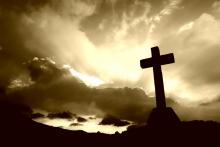
Summertime is "revival season" for Christians of various denominations. Traditionally revivals, or "Great Awakenings", have preceded most major movements in American society, like the Revolutionary War and the Civil War. Revival involves not only a supernatural outpouring of the Holy Spirit but an intense time of confession, repentance, and crying out to God to make us and our communities right.
This summer will mark two major Civil Rights anniversaries: the 50th Anniversary of the March on Washington and 58th Anniversary of Emmitt Till’s death. It is my belief that providence provides us with divine appointments that can be overlooked as coincidences if we do not have the spiritual eyes to see. This summer appears to be one of those times of divine appointment.
The American Church has never truly mourned and repented of its original sin of racism, and sadly this sin has infected the Body of Yahshua (Christ) globally.

So,
No prom for you
Dear boy
No wedding
No children
No memories of you and family
For momma and daddy to savor
Just holes in their hearts to match
the hole
In yours
But as God is my witness
Sweet boy
You will never be forgotten
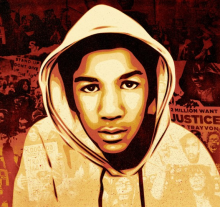
As we inched our way forward, the four lanes of the highway converged into one lane as we made our way around a terrible accident. We joined the long line of cars that passed the scene of the accident one by one, and we slowed — as did the others — to see what we could of the crash. But the moment we moved past the accident, the highway opened up to us, inviting us to freely and quickly accelerate.
And I began to think that tragedies like these cause us to slow down, and even come to a stop. They cause us to open our eyes for a moment and see that our actions have consequences. But on the other side of these tragedies, we tend to somehow find the freedom to move on, and to move on with strength. The only question is whether or not we will take what we see to heart, and resolve to be better drivers on the other side.

My father is white, and has lived a different story. My son was the same age as Trayvon Martin when Martin was killed in Florida in 2012. My white teenage son lives a different story. But when I got on a flight early on Sunday morning following the verdict, I was seated next to an African-American woman with six children. The weight of the verdict was on her face, and she showed me a photo of her three sons, all wearing hoodies, for whom Martin’s death and the subsequent verdict hit very close to home. This is their story.
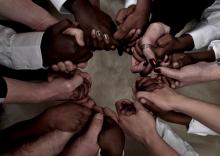
Death is horrible enough. But systematic injustice — one that allows white boys to assume success, yet leads black boys to cower from the very institutions created to protect our own wellbeing — is a travesty. Listen to the stories from Saturday and Sunday nights, of 12-year-old black boys who asked to sleep in bed with their parents because they were afraid. If black youth in America can’t rely on the police, the law, or their own neighborhood for protection — where can they go?

A top Southern Baptist official who was accused of plagiarism in a radio segment that claimed civil rights leaders and President Obama used the Trayvon Martin case to stir racial tensions will lose his weekly call-in program but can keep his main job, a church panel announced Friday.
Richard Land, the influential head of the Southern Baptist Convention's Ethics & Religious Liberty Commission and the denomination’s top policy spokesman, was rebuked for racial insensitivity and for not attributing the source of his radio commentaries after a review by ERLC trustees.
The controversy over Land’s explosive remarks in a March 31 radio program was especially awkward as Southern Baptists are expected to elect an African-American pastor, the Rev. Fred Luter, as the denomination's first black president later this month.
The investigators chided Land for “his hurtful, irresponsible, insensitive, and racially charged words” in a broadcast of the “Richard Land Live!” show in which Land accused Obama and black civil rights activists of using the Trayvon Martin shooting to foment racial strife and boost the president’s re-election chances.
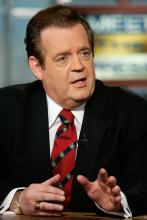
For the past 24 years, Richard Land has used his folksy charm and fiery rhetoric to become one of the leading voices of the religious right and the public face of the Southern Baptist Convention, the nation's largest Protestant group.
Now Land's future is in doubt amid an investigation over his remarks about the Trayvon Martin shooting and for alleged plagiarism.
A church committee is scheduled to issue its report by Friday (June 1), and there's a possibility that Land could lose his job as president of the Southern Baptists' Nashville-based Ethics & Religious Liberty Commission.
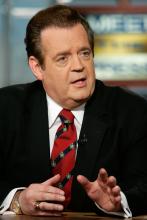
Southern Baptist leader Richard Land has issued a lengthy public apology for his racially charged comments about the Trayvon Martin case, and said he has sent a personal letter to President Obama seeking forgiveness.
Land, who leads the Southern Baptist Convention's Ethics and Religious Liberty Commission, issued the two-page apology Wednesday (May 9), a week after a five-hour meeting with African-American leaders and other Southern Baptist officials.
Because of that meeting, "I have come to understand in sharper relief how damaging my words were," he wrote in the statement released through his denomination's news service.
Land had previously apologized for his comments, which charged Democrats and civil rights leaders with exploiting the killing of the unarmed Florida teen. He also has apologized for failing to attribute the material he used when discussing the case on his radio show.

I know plenty of reasonable, kind, law-abiding people who carry guns. One guy, a pilot, needs to be able to handle a firearm secured in the cockpit as part of his job. Others are hunters, police officers and former military. For them, the gun is not a status symbol. It isn’t a tool used to intimidate or threaten. Unless you know them well, you probably wouldn’t ever know they even carry guns.
And all of them are members of the National Rifle Association.
However, like many groups (organized religion included), these are not the spokespeople for the whole body that we tend to see. Rather, it’s the bombastic wing-nuts like Charlton Heston who can certainly grab headlines, but not necessarily always in the way the constituency would prefer to be represented.

Southern Baptist leaders will investigate whether their top ethicist and public policy director plagiarized racially charged remarks about the Trayvon Martin case that many say set back the denomination's efforts on racial reconciliation.
Richard Land, who leads the Ethics and Religious Liberty Commission for the Southern Baptist Convention, was accused of lifting remarks for his radio show that accused Democrats and civil rights leaders of exploiting the case of the unarmed Florida teenager who was shot and killed by a volunteer neighborhood watchman.
Even though Land has apologized for both the remarks and not attributing their source, the commission's executive committee said it was obligated “to ensure no stone is left unturned.” An investigatory committee will "recommend appropriate action" to church leaders.

The Southern Baptist Convention's top public policy official has apologized for controversial comments he made about the Trayvon Martin case, and the New Orleans pastor who's widely expected to be named the Southern Baptists' first black president has accepted his apology.
Richard Land, who leads the SBC's Ethics and Religious Liberty Commission, wrote to SBC president Bryant Wright to express his “deep regret for any hurt or misunderstanding" his comments may have caused.